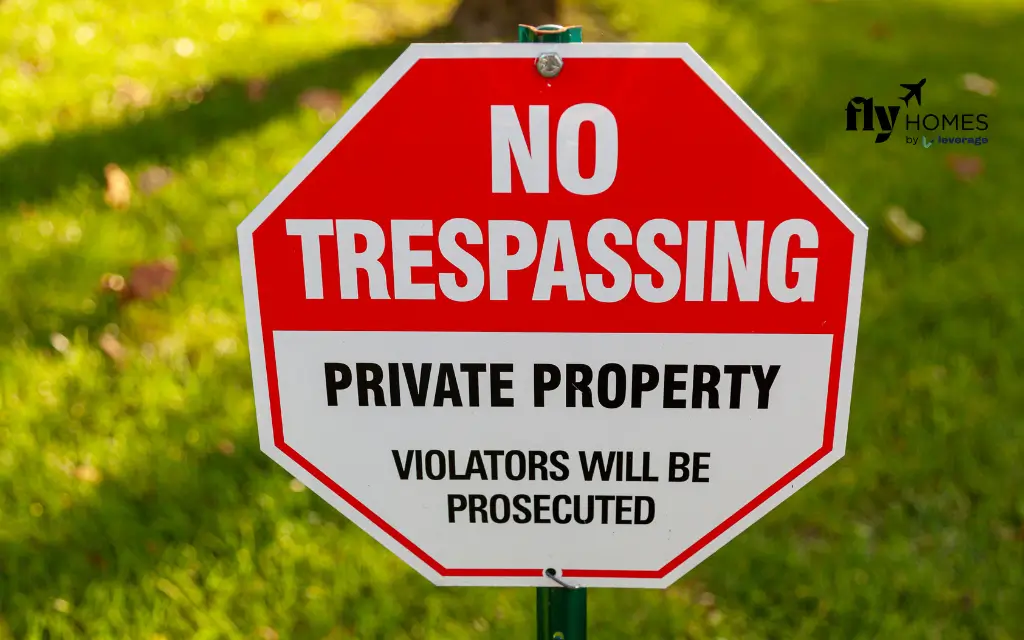If you’re an international student in the UK, it’s good to know about local rules, including trespassing laws. Trespassing means going onto someone else’s land or property without permission. Sometimes, you might do this by mistake while exploring or walking around.In this guide, we’ll explain what trespassing is, what the law says in the UK, and what international students should know to stay out of trouble.
This Blog Includes:
What is Trespassing?
Trespassing is known as ‘tort’ in legal terminology. It means illegally entering another person’s property. Every piece of private land belongs to someone in the UK, if you enter that piece of land without the owner’s permission then it would be considered trespassing. Trespassing can also happen on public property. For example, it is illegal to enter a public park after the operating hours.
Types of Trespassing
If you are enjoying your stay in student accommodation in United Kingdom, then you must be aware of various types of trespass. The most common form of trespassing is entering on another person’s property without permission. Some other forms of trespassing include-
- Placing objects on another person’s land.
- Removing land or property from the plaintiff’s land.
- Remaining on someone’s land when permission has expired.
Some other actions under specific circumstances can also be considered as trespassing. For example, if you use someone else’s land for drilling and using minerals beneath the property. Overhanging structures that may take up the space of an adjoining property can also amount to trespassing.
Though international students are careful while living abroad, however, knowing about the intricacies of any law can be very helpful to avoid any unfortunate incident in the future. Keeping this in mind, let’s understand the trespassing laws in the UK.
Also Read: If you are planning to study abroad, then you must read Places to Study Abroad in Europe
What are the Trespassing Laws in the UK?
Trespassing is generally considered a civil wrong. However, in some parts of the UK, certain forms of trespassing such as those involving squatters, raves, and hunt saboteurs are covered under criminal law. Under Sections 61 and 62 of the Criminal Justice and Public Order Act of 1994, trespassing on land and trespassing with vehicles is considered a criminal offence.
Another important law that students must be aware of is the Legal Aid Sentencing and Punishment of Offenders Act 2012. Section 144 of this Act makes squatting on a residential property an offence. The situations that are considered an offence as per this Act include-
- Entering and remaining in the property as a trespasser.
- Knowing that one is acting as a trespasser.
- Living in the building and intending to live there for any period.
What Action Can Be Taken Under the Trespassing Laws?
If anybody is trespassing on a property in the UK, then the police can enter the property to investigate and arrest the offender. The offence of trespassing carries a penalty of up to 51 weeks imprisonment or an additional fine. The owner of the land can also deal with the trespassing by way of injunction.
Further Read: If you are planning to move to the UK, then you must read Cheapest Cities to Live in the UK for International students
Tips to Avoid Trespassing as an International Student
When you’re new to a country, it’s easy to get confused about property rules and public spaces. To stay safe and follow the law, here are some simple tips to avoid trespassing:
1. Understand the Law: Learn what counts as trespassing in your city or state. Laws may vary, so check local rules or ask your school’s international office for guidance.
2. Respect Private Property Signs: Always look for signs like ‘No Trespassing,’ ‘Private Property,’ or ‘Do Not Enter.’ These signs are legal warnings and should never be ignored.
3. Don’t Enter Gated or Fenced Areas: Even if the gate is open or it looks empty, you should not enter private spaces unless you’ve been invited or have permission.
4. Stick to Public Spaces: Parks, sidewalks, public beaches, and university campuses are usually safe zones. Avoid walking through someone’s yard, driveway, or building unless it’s open to the public.
5. Ask Before Entering: If you’re not sure whether a place is private or public, ask someone before entering. It’s better to be safe than sorry.
FAQs on Trespassing Laws in the UK
The Criminal Justice and Public Order Act of 1994 makes trespassing a criminal offence.
Any kind of interference with somebody else’s land is considered trespassing. For example, throwing stones or materials over neighbouring land can be considered an act of trespassing.
Yes, squatting in a residential building is illegal and can be punished with six months in prison, a fine of GBP 5000, or both.
Trespassing on railway property is considered a criminal offence with a fine of up to GBP 1000. Trespassing on protected sites is also taken as a criminal offence.
Vehicles parked or abandoned on private land can be treated as civil trespass.
Most public parks are open to the public, but they may have rules about opening hours or restricted areas. Entering during closed times or into off-limits areas can count as trespassing.
No, flying a drone over private land without the owner’s permission may be treated as trespassing or a privacy issue. Always follow UK drone laws.
Yes, if you enter private property without permission to take photos, it can be considered trespassing-even if you don’t cause any harm.
Yes, depending on the situation. Criminal trespass can lead to fines up to GBP 5,000 or even prison time in serious cases like squatting or trespassing on protected sites.
No, you cannot walk across private farmland without permission unless there is a public footpath. Always look for signs and stay on marked paths to avoid trespassing.
This blog was all about the trespassing laws in the UK. For booking the best accommodation abroad to start your study abroad experience you can contact Fly Homes at 1800572118.
Follow Us on Social Media




























